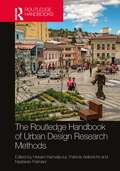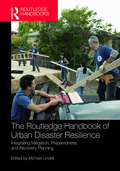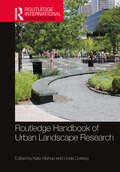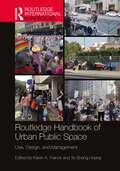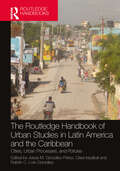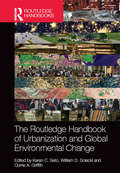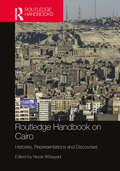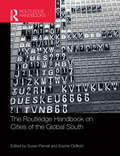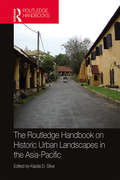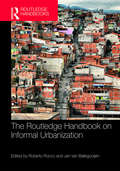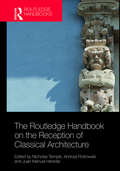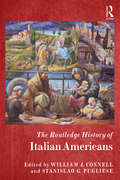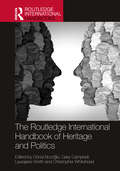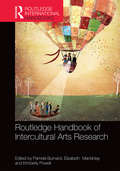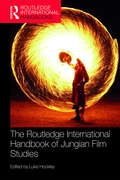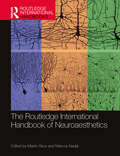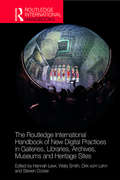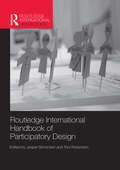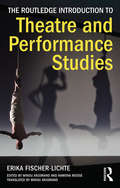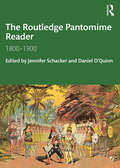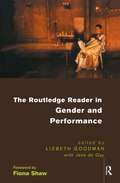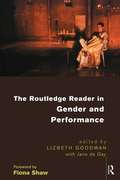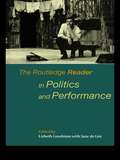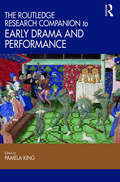- Table View
- List View
The Routledge Handbook of Urban Design Research Methods
by Hesam Kamalipour Patricia Aelbrecht Nastaran PeimaniAs an evolving and contested field, urban design has been made, unmade, and remade at the intersections of multiple disciplines and professions. It is now a decisive moment for urban design to reflect on its rigour and relevance. This handbook is an attempt to seize this moment for urban design to further develop its theoretical and methodological knowledge base and engage with the question of "what urban design can be" with a primary focus on its research. This handbook includes contributions from both established and emerging scholars across the global North and global South to provide a more field-specific entry point by introducing a range of topics and lines of inquiry and discussing how they can be explored with a focus on the related research designs and methods. The specific aim, scope, and structure of this handbook are appealing to a range of audiences interested and/or involved in shaping places and public spaces. What makes this book quite distinctive from conventional handbooks on research methods is the way it has been structured in relation to some key research topics and questions in the field of urban design regarding the issues of agency, affordance, place, informality, and performance. In addition to the introduction chapter, this handbook includes 80 contributors and 52 chapters organised into five parts. The commissioned chapters showcase a wide range of topics, research designs, and methods with references to relevant scholarly works on the related topics and methods.
The Routledge Handbook of Urban Disaster Resilience: Integrating Mitigation, Preparedness, and Recovery Planning
by Michael K. LindellThe Routledge Handbook of Urban Disaster Resilience emphasizes the intersection of urban planning and hazard mitigation as critical for community resilience, considering the interaction of social, environmental, and physical systems with disasters. The Handbook introduces and discusses the phases of disaster – mitigation, preparedness/response, and recovery – as well as each of the federal, state, and local players that address these phases from a planning and policy perspective. Part I provides an overview of hazard vulnerability that begins with an explanation of what it means to be vulnerable to hazards, especially for socially vulnerable population segments. Part II discusses the politics of hazard mitigation; the failures of smart growth placed in hazardous areas; the wide range of land development policies and their associated risk; the connection between hazards and climate adaptation; and the role of structural and non-structural mitigation in planning for disasters. Part III covers emergency preparedness and response planning, the unmet needs people experience and community service planning; evacuation planning; and increasing community capacity and emergency response in developing countries. Part IV addresses recovery from and adaption to disasters, with topics such as the National Disaster Recovery Framework, long-term housing recovery; population displacement; business recovery; and designs in disasters. Finally, Part V demonstrates how disaster research is interpreted in practice – how to incorporate mitigation into the comprehensive planning process; how states respond to recovery; how cities undertake recovery planning; and how to effectively engage the whole community in disaster planning. The Routledge Handbook of Urban Disaster Resilience offers the most authoritative and comprehensive coverage of cutting-edge research at the intersection of urban planning and disasters from a U.S. perspective. This book serves as an invaluable guide for undergraduate and postgraduate students, future professionals, and practitioners interested in urban planning, sustainability, development response planning, emergency planning, recovery planning, hazard mitigation planning, land use planning, housing and community development as well as urban sociology, sociology of the community, public administration, homeland security, climate change, and related fields.
Routledge Handbook of Urban Landscape Research (Routledge International Handbooks)
by Kate Bishop Linda CorkeryLandscape architecture is one of the key professions dedicated to making cities hospitable and healthy places to live, work and play, while respecting and enhancing the natural environments and landscapes we inhabit. This edited collection presents current writing about the pivotal roles that landscape architects play in addressing some of the most pressing problems facing the planet, its environments and its populations through their research, analysis and speculative practice. The book has assembled current writings on recent research structured around five major themes: governance, power and partnership; infrastructure, systems and performance; environment, resilience and climate change; people, place and design; and culture, heritage and identity. As a collection, the chapters demonstrate the diversity of themes and topics that are expanding the scholarly body of knowledge for the discipline and its relevance to the practice of landscape architecture. The contributors to this book are academic researchers and practitioners from the discipline of landscape architecture. The chapters draw on their research, teaching and experience as well as analysis of project examples. Fifty-two contributors from the United Stsates, United Kingdom, Sweden, Denmark, the Netherlands, Nigeria, Malaysia, Spain, Colombia, Australia, New Zealand and Canada discuss a diverse range of contemporary themes in urban landscape architecture. Collectively, the contributors demonstrate the breadth of experience, shared concerns and distinct issues that challenge urban landscape architecture and cities in the 21st century.
Routledge Handbook of Urban Public Space: Use, Design, and Management (Routledge International Handbooks)
by Karen A. FranckIs it truly the "end" of public space? This handbook presents evidence that the answer is "no". In cities in different parts of the world, people still use public space to pursue activities of their choice. The book is divided into seven sections. The first section presents three emerging types of public space. Each of the subsequent five sections focuses on a type of activity: recreation, commerce, protest, living and celebration. These sections are international in scope, presenting cases of activities in Brazil, China, Colombia, DR Congo, Egypt, Finland, Germany, Libya, Taiwan, Turkey and the U.S. The closing section, composed of three chapters, presents research methods for studying public space. Graduate students, faculty members and researchers in social science, architecture, landscape architecture, geography and urban design will find the book useful for understanding, studying and designing urban public space.
The Routledge Handbook of Urban Studies in Latin America and the Caribbean: Cities, Urban Processes, and Policies
by Jesús M. González-Pérez Clara Irazábal Rubén C. Lois-GonzálezThis handbook presents the great contemporary challenges facing cities and urban spaces in Latin America and the Caribbean. The content of this multidisciplinary book is organized into four large sections focusing on the histories and trajectories of urban spatial development, inequality and displacement of urban populations, contemporary debates on urban policies, and the future of the city in this region. Scholars of diverse origins and specializations analyze Latin American and Caribbean cities showing that, despite their diversity, they share many characteristics and challenges and that there is value in systematizing this knowledge to both understand and explain them better and to promote increasing equity and sustainability. The contributions in this handbook enhance the theoretical, empirical and methodological study of urbanization processes and urban policies of Latin America and the Caribbean in a global context, making it an important reference for scholars across the world. The book is designed to meet the interdisciplinary study and consultation needs of undergraduate and graduate students of architecture, urban design, urban planning, sociology, anthropology, political science, public administration, and more.
The Routledge Handbook of Urbanization and Global Environmental Change (Routledge International Handbooks)
by Karen C. Seto William D. Solecki Corrie A. GriffithThis volume provides a comprehensive overview of the interactions and feedbacks between urbanization and global environmental change. A key focus is the examination of how urbanization influences global environmental change, and how global environmental change in turn influences urbanization processes. It has four thematic foci: Theme 1 addresses the pathways through which urbanization drives global environmental change. Theme 2 addresses the pathways through which global environmental change affects the urban system. Theme 3 addresses the interactions and responses within the urban system in response to global environmental change. Theme 4 centers on critical emerging research.
Routledge Handbook on Cairo: Histories, Representations and Discourses
by Nezar AlSayyadThis Handbook simultaneously provides a single text that narrates the Cairo of yesterday and of today, and gives the reader a major reference to the best of Cairo scholarship. Divided into three parts covering Histories, Representations and Discourses of Cairo, the chapters provide comprehensive coverage of Cairo from both a disciplinary and an interdisciplinary point of view, with scholars from a great range of disciplines. Part One contains chapters on the history of specific parts of the city to provide both a concise picture of Cairo and an appreciation for the diversity of its constituent parts and periods. Part Two of the book deals with the various forms of representations of the city, from high-end literature to popular songs, and from photographs to films. Finally, Part Three covers current discourses about the city, comprising historical reflections on the city from the present, surveys of its current condition, analysis of it serious urban problems and visions for its future. The Routledge Handbook on Cairo provides a unique and innovative look at the ever-evolving state of Cairo. It will be a vital reference source for scholars and students of Middle Eastern Studies, Middle East History, Cultural Studies, Urban Studies, Architecture and Politics.
The Routledge Handbook on Cities of the Global South
by Susan Parnell Sophie OldfieldThe renaissance in urban theory draws directly from a fresh focus on the neglected realities of cities beyond the west and embraces the global south as the epicentre of urbanism. This Handbook engages the complex ways in which cities of the global south and the global north are rapidly shifting, the imperative for multiple genealogies of knowledge production, as well as a diversity of empirical entry points to understand contemporary urban dynamics. The Handbook works towards a geographical realignment in urban studies, bringing into conversation a wide array of cities across the global south – the ‘ordinary’, ‘mega’, ‘global’ and ‘peripheral’. With interdisciplinary contributions from a range of leading international experts, it profiles an emergent and geographically diverse body of work. The contributions draw on conflicting and divergent debates to open up discussion on the meaning of the city in, or of, the global south; arguments that are fluid and increasingly contested geographically and conceptually. It reflects on critical urbanism, the macro- and micro-scale forces that shape cities, including ideological, demographic and technological shifts, and constantly changing global and regional economic dynamics. Working with southern reference points, the chapters present themes in urban politics, identity and environment in ways that (re)frame our thinking about cities. The Handbook engages the twenty-first-century city through a ‘southern urban’ lens to stimulate scholarly, professional and activist engagements with the city.
The Routledge Handbook on Historic Urban Landscapes in the Asia-Pacific (Routledge International Handbooks)
by Kapila SilvaThe Routledge Handbook on Historic Urban Landscapes in the Asia-Pacific sheds light onto the balancing act of urban heritage management, focusing specifically on the Asia-Pacific regions in which this challenge is imminent and in need of effective solutions. Urban heritage, while being threatened amid myriad forces of global and ecological change, provides a vital social, cultural, and economic asset for regeneration and sustenance of liveability of inhabited urban areas worldwide. This six-part volume takes a critical look at the concept of Historic Urban Landscapes, the approach that UNESCO promotes to achieve holistic management of urban heritage, through the lens of issues, prospects, and experiences of urban regeneration of the selected geo-cultural context. It further discusses the difficult task that heritage managers encounter in conceptualizing, mapping, curating, and sustaining the plurality, poetics, and politics of urban heritage of the regions in question. The connective thesis that weaves the chapters in this volume together reinforces for readers that the management of urban heritage considers cities as dynamic entities, palimpsests of historical memories, collages of social diversity, territories of contested identities, and sites for sustainable liveability. Throughout this edited collection, chapters argue for recognizing the totality of the eco-cultural urban fabric, embracing change, building social cohesion, and initiating strategic socio-economic progress in the conservation of Historic Urban Landscapes. Containing thirty-seven contributions written by leading regional experts, and illustrated with over 200 black and white images and tables, this volume provides a much-needed resource on Historic Urban Landscapes for students, scholars, and researchers.
The Routledge Handbook on Informal Urbanization
by Roberto Rocco Jan Van BallegooijenThe Routledge Handbook on Informal Urbanization investigates the mutual relationship between the struggle for political inclusion and processes of informal urbanization in different socio-political and cultural settings. It seeks a middle ground between two opposing perspectives on the political meaning of urban informality. The first, the ‘emancipatory perspective’, frames urban informality as a practice that fosters autonomy, entrepreneurship and social mobility. The other perspective, more critical, sees informality predominantly as a result of political exclusion, inequality, and poverty. Do we see urban informality as a fertile breeding ground for bottom-up democracy and more political participation? Or is urban informality indeed merely the result of a democratic deficit caused by governing autocratic elites and ineffective bureaucracies? This book displays a wide variety of political practices and narratives around these positions based on narratives conceived upon specific case cities. It investigates how processes of urbanization are politicized in countries in the Global South and in transition economies. The handbook explores 24 cities in the Global South, as well as examples from Eastern Europe and East Asia, with contributions written by a global group of scholars familiar with the cases (often local scholars working in the cities analyzed) who offer unique insight on how informal urbanization can be interpreted in different contexts. These contributions engage the extreme urban environments under scrutiny which are likely to be the new laboratories of 21st-century democracy. It is vital reading for scholars, practitioners, and activists engaged in informal urbanization.
The Routledge Handbook on the Reception of Classical Architecture
by Nicholas Temple Andrzej Piotrowski Juan Manuel HerediaThis is the first comprehensive study of the reception of classical architecture in different regions of the world. Exploring the impact of colonialism, trade, slavery, religious missions, political ideology and intellectual/artistic exchange, the authors demonstrate how classical principles and ideas were disseminated and received across the globe. By addressing a number of contentious or unresolved issues highlighted in some historical surveys of architecture, the chapters presented in this volume question long-held assumptions about the notion of a universally accepted ‘classical tradition’ and its broadly Euro-centric perspective. Featuring thirty-two chapters written by international scholars from China, Europe, Turkey, North America, Mexico, Australia and New Zealand, the book is divided into four sections: 1) Transmission and re-conceptualisation of classical architecture; 2) Classical influence through colonialism, political ideology and religious conversion; 3) Historiographical surveys of geographical regions; and 4) Visual and textual discourses. This fourfold arrangement of chapters provides a coherent structure to accommodate different perspectives of classical reception across the world, and their geographical, ethnographic, ideological, symbolic, social and cultural contexts. Essays cover a wide geography and include studies in Italy, France, England, Scotland, the Nordic countries, Greece, Austria, Portugal, Romania, Germany, Poland, India, Singapore, China, the USA, Mexico, Brazil, New Zealand and Australia. Other essays in the volume focus on thematic issues or topics pertaining to classical architecture, such as ornament, spolia, humanism, nature, moderation, decorum, heresy and taste. An essential reference guide, The Routledge Handbook on the Reception of Classical Architecture makes a major contribution to the study of architectural history in a new global context.
The Routledge History of Italian Americans (Routledge Histories)
by William J. Connell Stanislao G. PuglieseThe Routledge History of Italian Americans weaves a narrative of the trials and triumphs of one of the nation’s largest ethnic groups. This history, comprising original essays by leading scholars and critics, addresses themes that include the Columbian legacy, immigration, the labor movement, discrimination, anarchism, Fascism, World War II patriotism, assimilation, gender identity and popular culture. This landmark volume offers a clear and accessible overview of work in the growing academic field of Italian American Studies. Rich illustrations bring the story to life, drawing out the aspects of Italian American history and culture that make this ethnic group essential to the American experience.
The Routledge History of Italian Americans (Routledge Histories)
by William Connell Stanislao PuglieseThe Routledge History of Italian Americans weaves a narrative of the trials and triumphs of one of the nation’s largest ethnic groups. This history, comprising original essays by leading scholars and critics, addresses themes that include the Columbian legacy, immigration, the labor movement, discrimination, anarchism, Fascism, World War II patriotism, assimilation, gender identity and popular culture. This landmark volume offers a clear and accessible overview of work in the growing academic field of Italian American Studies. Rich illustrations bring the story to life, drawing out the aspects of Italian American history and culture that make this ethnic group essential to the American experience.
The Routledge International Handbook of Heritage and Politics (Routledge Handbooks on Museums, Galleries and Heritage)
by Gönül Bozoğlu Gary Campbell Laurajane Smith Christopher WhiteheadThe Routledge International Handbook of Heritage and Politics surveys the intersection of heritage and politics today and helps elucidate the political implications of heritage practices. It explicitly addresses the political and analyses tensions and struggles over the distribution of power. Including contributions from early-career scholars and more established researchers, the Handbook provides global and interdisciplinary perspectives on the political nature, significance and consequence of heritage and the various practices of management and interpretation. Taking a broad view of heritage, which includes not just tangible and intangible phenomena, but the ways in which people and societies live with, embody, experience, value and use the past, the volume provides a critical survey of political tensions over heritage in diverse social and cultural contexts. Chapters within the book consider topics such as: neoliberal dynamics; terror and mobilisations of fear and hatred; old and new nationalisms; public policy; recognition; denials; migration and refugeeism; crises; colonial and decolonial practice; communities; self- and personhood; as well as international relations, geopolitics, soft power and cooperation to address global problems.The Routledge International Handbook of Heritage and Politics makes an intervention into the theoretical debate about the nature and role of heritage as a political resource. It is essential reading for academics and students working in heritage studies, museum studies, politics, memory studies, public history, geography, urban studies and tourism.
The Routledge International Handbook of Intercultural Arts Research (Routledge International Handbooks of Education)
by Kimberly Powell Elizabeth Mackinlay Pamela BurnardFor artists, scholars, researchers, educators and students of arts theory interested in culture and the arts, a proper understanding of the questions surrounding ‘interculturality’ and the arts requires a full understanding of the creative, methodological and interconnected possibilities of theory, practice and research. The International Handbook of Intercultural Arts Research provides concise and comprehensive reviews and overviews of the convergences and divergences of intercultural arts practice and theory, offering a consolidation of the breadth of scholarship, practices and the contemporary research methodologies, methods and multi-disciplinary analyses that are emerging within this new field.
The Routledge International Handbook of Jungian Film Studies (Routledge International Handbooks)
by Luke HockleyThe Routledge International Handbook of Jungian Film Studies weaves together the various strands of Jungian film theory, revealing a coherent theoretical position underpinning this exciting recent area of research, while also exploring and suggesting new directions for further study. The book maps the current state of debates within Jungian orientated film studies and sets them within a more expansive academic landscape. Taken as a whole, the collection shows how different Jungian approaches can inform and interact with a broad range of disciplines, including literature, digital media studies, clinical debates and concerns. The book also explores the life of film outside cinema - what is sometimes termed ‘post-cinema’ - offering a series of articles exploring Jungian approaches to cinema and social media, computer games, mobile screens, and on-line communities. The Routledge International Handbook of Jungian Film Studies represents an essential resource for students and researchers interested in Jungian approaches to film. It will also appeal to those interested in film theory more widely, and in the application of Jung’s ideas to contemporary and popular culture.
The Routledge International Handbook of Neuroaesthetics (Routledge International Handbooks)
by Martin Skov Marcos NadalThe Routledge International Handbook of Neuroaesthetics is an authoritative reference work that provides the reader with a wide-ranging introduction to this exciting new scientific discipline. The book brings together leading international academics to offer a well-balanced overview of this burgeoning field while addressing two questions central to the field: how the brain computes aesthetic appreciation for sensory objects and how art is created and experienced. The editors, Martin Skov and Marcos Nadal, have compiled a neuroscientific, physiological, and psychological overview of the systems underlying the evaluation of sensory objects and aesthetic appreciation. Covering a variety of art forms mediated by vision, audition, movement, and language, the handbook puts forward a critical review of the current research to explain how and why perceptual and emotional processes are essential for art production. The work also unravels the interaction of art with expectations, experience and knowledge and the modulation of artistic appreciation through social and contextual settings, eventually bringing to light the potential of art to influence mental states, health, and well-being. The concepts are presented through research on the neural processes enabling artistic creativity, artistic expertise, and the evolution of symbolic cognition. This handbook is a compelling read for anyone interested in making a first venture into this exciting new area of study and is best suited for students and researchers in the fields of neuroaesthetics, perceptual learning, and cognitive psychology.
The Routledge International Handbook of New Digital Practices in Galleries, Libraries, Archives, Museums and Heritage Sites (Routledge International Handbooks)
by Hannah Lewi Wally Smith Dirk Vom Lehn Steven CookeThe Routledge International Handbook of New Digital Practices in Galleries, Libraries, Archives, Museums and Heritage Sites presents a fascinating picture of the ways in which today's cultural institutions are undergoing a transformation through innovative applications of digital technology. With a strong focus on digital design practice, the volume captures the vital discourse between curators, exhibition designers, historians, heritage practitioners, technologists and interaction designers from around the world. Contributors interrogate how their projects are extending the traditional reach and engagement of institutions through digital designs that reconfigure the interplay between collections, public knowledge and civic society. Bringing together the experiences of some of today’s most innovative cultural institutions and thinkers, the Handbook provides refreshingly new ideas and directions for the exciting digital challenges and opportunities that lie ahead. As such, it should be essential reading for academics, students, designers and professionals interested in the production of culture in the post-digital age.
Routledge International Handbook of Participatory Design (Routledge International Handbooks)
by Jesper Simonsen Toni RobertsonParticipatory design is about the direct involvement of people in the co-design of the technologies they use. Its central concern is how collaborative design processes can be driven by the participation of the people affected by the technology designed. Embracing a diverse collection of principles and practices aimed at making technologies, tools, environments, businesses, and social institutions more responsive to human needs, the International Handbook of Participatory Design is a state-of-the-art reference handbook for the subject. The Handbook brings together a multidisciplinary and international group of highly recognized and experienced experts to present an authoritative overview of the field and its history and discuss contributions and challenges of the pivotal issues in participatory design, including heritage, ethics, ethnography, methods, tools and techniques and community involvement. The book also highlights three large-scale case studies which show how participatory design has been used to bring about outstanding changes in different organizations. The book shows why participatory design is an important, highly relevant and rewarding area for research and practice. It will be an invaluable resource for students, researchers, scholars and professionals in participatory design.
The Routledge Introduction to Theatre and Performance Studies
by Erika Fischer-Lichte Minou Arjomand Ramona MosseErika Fischer-Lichte's introduction to the discipline of Theatre and Performance Studies is a strikingly authoritative and wide ranging guide to the study of theatre in all of its forms. Its three-part structure moves from the first steps in starting to think about performance, through to the diverse and interrelated concerns required of higher-level study: Part 1 - Central Concepts for Theatre and Performance Research - introduces the language and key ideas that are used to discuss and think about theatre: concepts of performance; the emergence of meaning; and the theatrical event as an experience shared by actors and spectators. Part 1 contextualizes these concepts by tracing the history of Theatre and Performance Studies as a discipline. Part 2 - Fields, Theories and Methods - looks at how to analyse a performance and how to conduct theatre-historiographical research. This section is concerned with the 'doing' of Theatre and Performance Studies: establishing and understanding different methodological approaches; using sources effectively; and building theoretical frameworks. Part 3 - Pushing Boundaries - expands on the lessons of Parts 1 and 2 in order to engage with theatre and performance in a global context. Part 3 introduces the concept of 'interweaving performance cultures'; explores the interrelation of theatre with the other arts; and develops a transformative aesthetics of performance. Case studies throughout the book root its theoretical discussion in theatrical practice. Focused accounts of plays, practitioners and performances map the development of Theatre and Performance Studies as an academic discipline, and of the theatre itself as an art form. This is the most comprehensive and sophisticated introduction to the field available, written by one of its foremost scholars.
The Routledge Pantomime Reader: 1800-1900
by Jennifer SchackerThe Routledge Pantomime Reader is the first anthology to document this entertainment genre—one of the most distinctive and ubiquitous in nineteenth-century Britain. Across ten different shows, readers witness pantomime’s development from a highly improvisational venue for clowning, dance, and musical parody to a complex amalgamation of physical and topical comedy, stage wizardry, scenic spectacle, satire, and magical mayhem. Combining well-known tales such as "Cinderella", "Aladdin", and "Jack and the Beanstalk" with the lesser-known plotlines of "Peter Wilkins" and "The Prince of Happy Land", the book demonstrates not only how popular narratives were adapted to the current moment, but also how this blend of high and low entertainment addressed a whole range of social and cultural anxieties. Along with carefully annotated scripts, readers will find detailed introductions to all of the collected pantomimes and supplementary materials such as reviews, reminiscences, and a host of visual materials that bring these neglected entertainments to life. The plays collected here provide a remarkable perspective on the history of sexuality, class, and race during a period of vast imperial expansion and important social upheaval in Britain itself—essential reading for students and scholars of theatre history and popular performance.
The Routledge Reader in Gender and Performance
by Lizbeth Goodman Jane De GayThe Routledge Reader in Gender and Performance presents the most influential and widely-known, critical work on gender and performing arts, together with exciting and provocative new writings. It provides systematically arranged articles to guide the reader from topic to topic, and specially linked articles by scholars and teachers to explain key issues and put the extracts in context. This comprehensive volume:* reviews women's contributions to theatre history* includes contributions from many of the top academics in this discipline* examines how theatre has represented women over the centuries* introduces readers to major theoretical approaches and more complex questions about gender, the body and cross-dressing* offers an international perspective, including material from post-apartheid South Africa and post-communist Russia.
Routledge Reader in Gender and Performance
by Lizbeth Goodman Jane De GayThe book presents some of the most influential and widely known work on gender and performing arts, together with exciting and provocative new writings in the field.
The Routledge Reader in Politics and Performance
by Jane De Gay Lizbeth GoodmanThe Routledge Reader in Politics and Performance brings together for the first time a comprehensive collection of extracts from key writings on politics, ideology, and performance. Taking an interdisciplinary approach to the subject, and including new writings from leading scholars, the book provides material on: * post-coloniality and performance theory and practice * critical theories and performance * intercultural perspectives * power, politics and the theatre * sexuality in performance * live arts and the media * theatre games.
The Routledge Research Companion to Early Drama and Performance (Routledge Companions)
by Pamela KingThe study of early drama has undergone a quiet revolution in the last four decades, radically altering critical approaches to form, genre, and canon. Drawing on disciplines from art history to musicology and reception studies, The Routledge Research Companion to Early Drama and Performance reconsiders early "drama" as a mixed mode entertainment best studied not only alongside non-dramatic texts, but also other modes of performance. From performance before the playhouse to the afterlife of medieval drama in the contemporary avant-garde, this stunning collection of essays is divided into four sections: Northern European Playing before the Playhouse; Modes of Production and Reception; Reviewing the Anglophone Tradition; The Long Middle Ages Offering a much needed reassessment of what is generally understood as "English medieval drama", The Routledge Research Companion to Early Drama and Performance provides an invaluable resource for both students and scholars of medieval studies.
